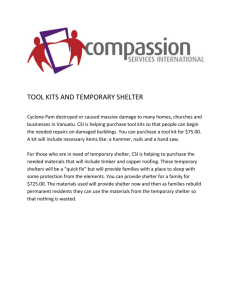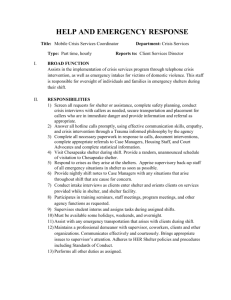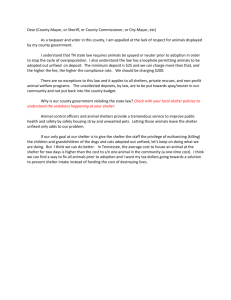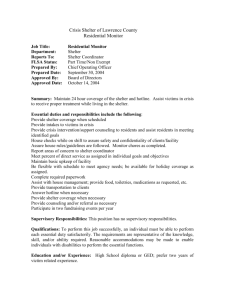Microsoft Word - callahanconsentdecree1981 - ESCR-Net
advertisement
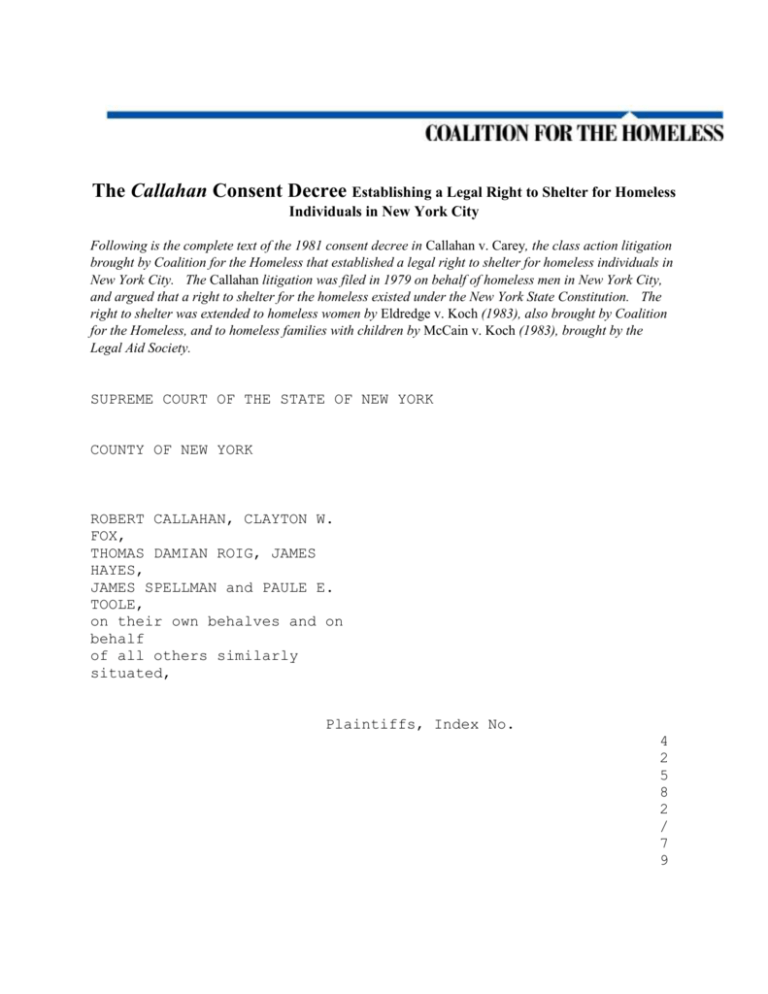
The Callahan Consent Decree Establishing a Legal Right to Shelter for Homeless Individuals in New York City Following is the complete text of the 1981 consent decree in Callahan v. Carey, the class action litigation brought by Coalition for the Homeless that established a legal right to shelter for homeless individuals in New York City. The Callahan litigation was filed in 1979 on behalf of homeless men in New York City, and argued that a right to shelter for the homeless existed under the New York State Constitution. The right to shelter was extended to homeless women by Eldredge v. Koch (1983), also brought by Coalition for the Homeless, and to homeless families with children by McCain v. Koch (1983), brought by the Legal Aid Society. SUPREME COURT OF THE STATE OF NEW YORK COUNTY OF NEW YORK ROBERT CALLAHAN, CLAYTON W. FOX, THOMAS DAMIAN ROIG, JAMES HAYES, JAMES SPELLMAN and PAULE E. TOOLE, on their own behalves and on behalf of all others similarly situated, Plaintiffs, Index No. 4 2 5 8 2 / 7 9 a g a i n s t F INAL HUGH L. CAREY, as Governor of the State JUDGMENT of New York, BABARA BLUM, as Commissioner BY CONSENT of the New York State Department of Social Service, EDWARD I. KOCH, as Mayor of the City of New York, JAMES A. KRAUSKOPF, as Commissioner of the New York City Human Resources Administration, and CALVIN REID, as Director of the Shelter Care Center for Men, Defendants. Plaintiffs Robert Callahan, Clayton Fox and Thomas Roig, having brought this action on October 2, 1979 challenging the sufficiency and quality of shelter for homeless men in New York City, and plaintiffs Callahan, Fox, Roig, James Hayes, James Spellman and Paul Toole, having filed their Amended Complaint on March 31, 1980, and defendants Hugh L. Carey, as Governor of the State of New York, and Barbara Blum, as Commissioner of the State of New York Department of Social Services (the “State defendants”), having filed their Amended Answer on January 19, 1981 therein denying the material allegations of the Amended Complaint, and defendants Edward Koch, as Mayor of the City of New York, Stanley Brezenoff, as Administrator of the New York City Human Resources Administration, and Calvin Reid, as director of the Shelter Care Center for Men (the ”Men’s Shelter”) (the “City defendants”), having filed their Amended Answer on January 19, 1981 therein denying the material allegations of the Amended Complaint, and Plaintiffs and defendants by their respective attorneys, having consented to the entry of this Final Judgment without any final adjudication of any issue of fact or law herein and without this Final Judgment constituting any evidence or admission by any party hereto with respect to any such issue: NOW, therefore, without final adjudication of any issue of fact or law herein and without this Final Judgment constituting any evidence or admission by any party hereto with respect to any issue, and upon consent of all parties, it is hereby ORDERED, ADJUDGED and DECREED as follows: Provision of Shelter .1. The City defendants shall provide shelter and board to each homeless man who applies for it provided that (a) the man meets the need standard to qualify for the home relief program established in New York State; or (b) the man by reason to physical, mental or social dysfunction is in need of temporary shelter. .Shelter Standards .2. The City defendants shall provide shelter at facilities operated in accordance with the standards set forth in this paragraph as soon as practicable and not later than September 1, 1981. The term “shelter facility” refers to the Keener Building, Camp LaGuardia, the Men’s Shelter and any other facility used by the City defendants to shelter homeless men. This paragraph does not apply to the Bowery lodging houses (Palace, Kenton, Union, Sunshine, Delevan and Stevenson) presently used by the City defendants to shelter homeless men (the “hotels”); if the City defendants choose to shelter homeless men in any additional Bowery lodging house, they will advise counsel for the plaintiffs and a good faith effort shall be made by plaintiffs and the City defendants to agree to operating standards for such facilities. .(a) Each resident shall receive a bed of a minimum of 30 inches in width, substantially constructed, in good repair an equipped with clean springs. .(b) Each bed shall be equipped with both a clean, comfortable, well-constructed mattress standard in size for the bed and a clean, comfortable pillow of average size. .(c) Each resident shall receive two clean sheets, a clean blanket, a clean pillow case, a clean towel, soap and toilet tissue. A complete change of bed linens and towels will be made for each new resident and at least once a week and more often as needed on an individual basis. .(d) Each resident shall receive a lockable storage unit. .(e) Laundry services shall be available to each resident not less than twice a week. .(f) A staff attendant to resident ratio of at least 2 per cent shall be maintained in each shelter facility at all times. .(g) A staff attendant trained in first aid shall be on duty in each shelter facility at all times. .(h) A minimum of ten hours per week of group recreation shall be available for each resident a each shelter facility. .(i) Residents shall be permitted to leave and to return to shelter facilities at reasonable hours and without hindrance. .(j) Residents of shelter facilities shall be provided transportation (public or private) to enable them to return to the site where they applied for shelter. .(k) Residents of shelter facilities shall be permitted to leave the facility by 7:00 a.m. if they so desire. .(l) Residents shall be permitted to receive and send mail and other correspondence without interception or interference. .(m) The City defendants shall make a good faith effort to provide pay telephones for use by the residents at each shelter facility. The City defendants shall bear any reasonable cost for the installation and maintenance of such telephones. .3. The capacity of shelter facilities shall be determined as follows: .(a) The capacity of newly constructed shelter facilities shall comply with the standards set forth in Appendix A, except in cases of emergency need as defined in Appendix B. .(b) The City defendants shall disclose to plaintiffs’ counsel any plan to convert an existing structure to a shelter facility and the intended capacity for the facility at least 30 days in advance of the implementation or execution of any such conversion plan. A reasonable capacity for each such facility shall be established. The standards set forth in Appendix A shall be used as guidelines in determining whether the planned capacity of the City defendants is reasonable. .(c) Effective December 31, 1981, the capacity of the Keener Building shall not exceed _____ except in cases of emergency need as defined in Appendix B, in which case the maximum number of men who may be sheltered in the Keener Building is ____. Between the date of entry of this judgment and December 31, 1981, the capacity of the Keener Building shall not exceed____. .(d) The capacity of Camp LaGuardia shall comply — by construction of new dormitory buildings — with the standards set forth in Appendix A, except in cases of emergency need as defined in Appendix B, as soon as practicable and not later than December 31, 1982, except that the individual rooms in the “Main Building” may be used as sleeping rooms for one person each. The construction start of such new dormitory buildings shall occur no later than March 1, 1982. Bowery Lodging Houses 4. Hotels presently used by the City defendants shall meet the following standards at the time of entry of this judgment and the City defendants shall maintain such standards thereafter: .(a) Each resident shall receive a bed, a clean mattress, two clean sheets, one clean blanket, one clean pillow and one clean pillow case. A complete change of bed linens (sheets and pillow case) shall be made for each new resident and at least once a week and more often as needed on as individual basis. .(b) Each resident shall be supplied with a clean towel, soap and toilet issue. A clean towel shall be provided to each new resident and towels shall be changed at least once a week and more often an needed on an individual basis. .(c) There shall be two trained security guards in the Palace Hotel between the hours of 8:00 p.m. and 4:00 a.m. and one trained security guard between the hours of 4:00 p.m. and 8:00 p.m., and 4:00 a.m. to 8:00 a.m. There shall be one trained security guard in the Kenton Hotel between the hours of 4:00 p.m. and 8:00 a.m. These security guards shall file with the City defendants incident reports on any incidents of violence or attempted violence occurring in the hotels. (d) Showers shall be available at the Men’s Shelter beginning at 7 a.m. and signs advising hotel residents of that fact shall be posted at the front desk in each hotel and at the door of each bathroom in each hotel. Persons showering at the Men’s Shelter shall be provided adequate supervision (including safeguarding of personal property), a clean towel, soap and, if requested, a delousing agent. .(e) A lockable storage unit of adequate size to store personal property shall be available either at the Men’s Shelter or at the hotels for each man sheltered by the City defendants at hotels. .(f) Heat shall be maintained in accordance with New York City guidelines for rental residences. .(g) Cleanliness shall be maintained throughout the hotels at all times. Intake Centers .5. The City defendants shall accept applications for shelter at the Men’s Shelter, 8 East Third Street, New York, New York and at 529 Eighth Avenue, New York, New York (the “central intake center”). Applications for shelter shall be accepted at all times at the Men’s Shelter, and applications for shelter shall be accepted at 529 Eighth .Avenue between the hours of 5:00 p.m. and 1:00 a.m., seven days per week. The City defendants shall provide direct transportation to shelter pursuant to paragraph 1, supra. The 529 Eighth Avenue intake center, shall be opened as a central intake center not later than September 1, 1981. .6. The City defendants shall operate additional satellite intake centers on a 24-hour basis Monday through Friday at the following locations: .(a) Harlem Hospital Center, 506 Lenox Avenue, New York, New York; .(b) King County Hospital Center, 451 Clarkson Avenue, Brooklyn, New York; .(c) Lincoln Hospital, 234 East 149th Street, Bronx, New York; and (d) Queens Hospital Center, 82-69 164th Street, Jamaica, New York. Men seeking shelter at the satellite intake centers shall be provided adequate fare for public transportation and clear written directions to either (i) a shelter facility, or (ii) a central intake center — according to the preference of the person seeking shelter. The City defendants shall provide direct transportation from the satellite intake centers to a shelter facility to all men who appear so physically or mentally disabled that they are unable to reach a shelter facility by public transportation. Satellite intake centers shall be opened not later than September 1, 1981. It is understood that the above satellite intake centers shall be operated in conjunction with borough crisis centers. In the event that the borough crisis center program is terminated, the City defendants may, in their discretion, reduce the hours of operation of the satellite intake centers to between 5 p.m. and 1 a.m. .7. The City defendants shall accept applications for shelter at shelter facilities providing that such applicants have applied for and have been found eligible for shelter by the City defendants within six months of the time of application at a shelter facility. Shelter facilities shall also provide shelter for one night to any person who has not previously applied for shelter who seeks shelter at a shelter facility after 8:00 p.m. .Community Participation .8. Each shelter facility, central intake center and satellite intake center, shall utilize the services of available community members to the maximum reasonable extent. These persons are not City employees or volunteers in a City sponsored program within the meaning of section 50(k) of the General Municipal Law and such persons shall execute statements to this effect. .Information 2. 9. The City defendants shall provide applicants for shelter with clear written information concerning other public assistance benefits to which they may be entitled at the time applicants apply for shelter. Compliance Monitoring 1. 10. Defendant Krauskopf shall appoint qualified employees with no administrative responsibility for providing shelter to monitor defendants’ shelter care program for men with respect to compliance with this decree.. These employees shall visit each shelter facility, central intake center, satellite intake center and hotel at least twice a month and will submit to defendant Krauskopf a written report at least twice a month describing compliance or lack thereof with each provision of the decree. These reports shall be made available to plaintiffs’ counsel upon reasonable notice. 2. 11. Plaintiffs’ representatives shall have full access to all shelter facilities, central intake centers and satellite intake centers, and plaintiffs’ counsel shall be provided access to any records relevant to the enforcement and monitoring of this decree. .12. Defendant Krauskopf shall deliver by hand each day to plaintiffs’ counsel a statement listing: .(a) The number of men who applied for shelter at each central intake center and at each satellite intake center; .(b) The number of men who were provided shelter at each shelter facility or hotel; .(c) The number of men who were denied shelter at each shelter facility, central intake center and satellite intake center and the reason for each such denial; .(d) The number of men who were accepted for shelter at each central intake center and satellite intake center who did not reach a shelter facility; and .(e) The number of men who were provided direct transportation from each satellite intake center to a shelter facility. .13. It is the intention of defendant Krauskopf to conduct daily inspections of the Palace Hotel and to deliver reports of such inspections each day to plaintiffs. It is also the intention of defendant Krauskopf to conduct inspections of the other hotels used by defendants to shelter homeless men not less than three times per week and to deliver reports of such inspections not less than three times a week to plaintiffs’ counsel. A sample of the inspection report form to be used is attached hereto as Exhibit C. .No Waivers .14. Nothing in this judgment permits any person, not-for-profit corporation, charitable organization, or governmental entity or subdivision to operate a shelter, as defined in New York Code of Rules and Regulations, Title 18, § 485.2(C), in violation of the .requirements of the New York Social Services Law, Title 18, of the New York Code of Rules and Regulations, or any other applicable law. 3. 15. Nothing in this judgment should operate or be construed as res judicata or collateral estoppel so as to foreclose any signatory party from any claim or defense in any subsequent administrative or judicial proceeding. 4. 16. Nothing in this judgment shall be deemed to authorize or to prevent the operation by the New York City Human Resources Administration of the Keener Building on Wards Island as a shelter or shelter facility after October 15, 1981, except in accord with a valid contract or agreement among the New York State Department of Social Services, the New York State Office of Mental Health and the New York City Human Resources Agency and with an operating certificate issued by the New York State Department of Social Services. 5. 17. The Commissioner of the New York State Department of Social Services agrees to reimburse the New York City Human Resources Agency for the operation of a shelter facility or shelter facilities referred to in this judgment pursuant to New York Social Services Law 153, except if such shelter facility fails to comply with the requirements for shelters contained in the New York Social Services Law or the New York Code of Rules and Regulations, Title 18; provided that nothing in this judgment can or does obligate the Legislature of the State of New York to appropriate funds. .18. Nothing in this judgment shall prevent, limit or otherwise interfere with the authority of the Commissioner of the New York State Department of Social Services to enforce and carry out her duties under the New York Social Services Law, Title 18, of the New York Code of Rules and Regulations, or any other applicable law. .Continuing Jurisdiction 6. 19. Jurisdiction is retained by this Court for the purpose of enabling any of the parties to this Final Judgment to apply to this Court at any time for such further orders and directions as may be necessary or appropriate for the construction, modification, or termination of this entire judgment or of any applicable provisions thereof, for the enforcement of compliance therewith, and for the punishment of violations thereof. New York, New York August 1981 Appendix A Space Requirements for Shelters for Adults .(1) Every facility shall have space for dining and leisure activities. .(2) Sleeping areas shall not be considered as dining or leisure areas. .(3) Space provided for dining shall be: .(i) at least 120 square feet in facilities with a certified bed capacity of less than 10 beds; .(ii) at least 12 square feet for each additional certified bed. .(4) Space provided for leisure areas shall be: .(i) at least 120 square feet in facilities with a certified bed capacity of less than 10 beds. .(ii) at least 12 square feet per bed in facilities with a certified bed capacity of 10 or more beds .(5) When not in use, dining space may be used, with written approval from the New York State Department of Social Services (“Department”), as leisure space. .(6) An operator may request Department approval of a waiver to reduce the square footage requirements for dining and leisure space. A waiver shall be granted only upon demonstration by the operator that the food service and the program needs of residents can be met. .(7) Baths and Toilet Facilities There shall be a minimum of one toilet and one lavatory for each six residents and a minimum of one tub or shower for each ten residents. .(8) Sleeping Rooms .(i) In single occupancy sleeping rooms, a minimum of 80 square feet per resident shall be provided; .(ii) In sleeping rooms for two or more residents, a minimum of 60 square feet per resident shall be provided; .(iii) A minimum of 3 feet, which is included in the per resident minima, shall be maintained between beds and for aisles; .(iv) Partitions separating sleeping areas from other areas shall be ceiling high and smoke tight; .(v) All bedrooms shall be: .(a) above grade level; .(b) adequately lighted; .(c) adequately ventilated; .(vi) light and ventilation for bedrooms shall be by means of windows in an outside wall; .(vii) bedrooms shall open directly into exit corridors; .(viii) bedrooms may not be used as a passageway, corridor or access to other bedrooms. .(9) Adequate storage space for cleaning supplies and equipment shall be provided. Appendix B Short term emergency shelter may be provided to a number of persons in excess of the capacity of the facility provided that all of the following conditions are met: .(1) Snow emergencies, excessive cold or other similar circumstances create an emergency need for additional shelter space; .(2) The operator is able to meet the food and shelter needs of all persons in residence; .(3) The facility remains in compliance with applicable local building, fire protection and health and sanitation codes; .(4) The operator advises plaintiffs’ counsel of the maximum number of persons to be cared for during an emergency situation in any facility as soon as possible after an emergency situation develops; .(5) The operator provides shelter to additional persons no more than 30 days in any calendar year; and .(6) The operator maintains records which document adherence to these conditions.


